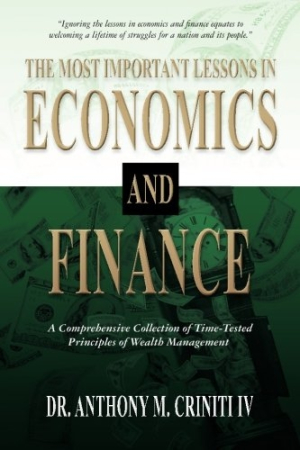The Most Important Lessons in Economics and Finance
A Comprehensive Collection of Time-Tested Principles of Wealth Management
The Most Important Lessons in Economics and Finance is an insightful text that gathers business principles together, showcasing personal and social economic strategies.
Anthony M. Criniti IV’s thoughtful business and economics book The Most Important Lessons in Economics and Finance suggests means of building and maintaining wealth.
The text begins with the interesting premise that surveying business and economic texts can result in a comprehensive collection of tactics and strategies, akin to natural laws. Such arguments are supported with a mixture of personal anecdotes, quoted ideas, and observations about the financial world. These concepts are intriguing, if they come with limited supporting documentation, making it difficult to parse how sweeping Criniti’s process of accumulation was. Further, the book often relies on Criniti’s previous work to make its points.
Less a self-help business work than it is concerned with presenting a new philosophy of wealth, the book is organized into a three-part structure. It first frames its project, then shares its principles, and concludes with a section underscoring its themes. The material is focused, approachable, and understandable, moreso because of the book’s clear table of contents and index.
The second and bulkiest portion of the book is made up of two hundred and eighteen individual principles, attributed to careful consideration of “the most important related subjects in economics and finance and their respective lessons.” These cover a broad range of material, including topics of business, debt, and ethics. Each principle is further attributed to Criniti’s “personal qualitative analysis,” reflecting his years of study as a finance professor, working in the field, and as an investor.
But the book’s principles sometimes conflict: it both advocates against keeping significant amounts of cash close at hand, and suggests keeping a three-month supply of cash and gold to deal with hard times, for example. When the principles are made to stand alone, independent of context or connections, they are more compelling.
The text is written in a scholastic style. Each principle is defined in a short sentence: Principle 106, for example, is “Never invest in anything that you do not understand.” The principles are then expanded upon with short narrative explanations: “This principle has been recognized by many of the greatest investors, including Peter Lynch and Donald Trump.” But the book is brief for the number of principles its shares, and there is little accompanying exposition to buttress its claims. Its broad notions are unexamined and presented as facts. Its chapter on economics, which addresses the wealth of nations, best exemplifies its range and potential, as well as its combination of personal advice with larger economic ideas.
The Most Important Lessons in Economics and Finance is an insightful text that gathers business principles together, showcasing personal and social economic strategies.
Reviewed by
Jeremiah Rood
Disclosure: This article is not an endorsement, but a review. The publisher of this book provided free copies of the book and paid a small fee to have their book reviewed by a professional reviewer. Foreword Reviews and Clarion Reviews make no guarantee that the publisher will receive a positive review. Foreword Magazine, Inc. is disclosing this in accordance with the Federal Trade Commission’s 16 CFR, Part 255.

